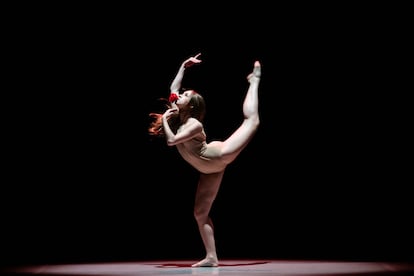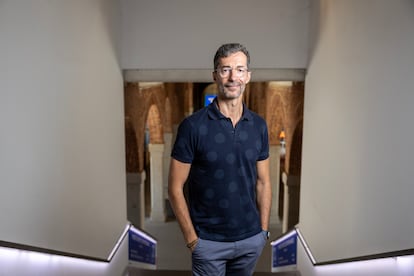They are so young that it is necessary to wait for music to sound to check their ability. Surveys Precise, intertwined well drawn and pirouettes who has been doing them for years. They dance while they attend the orders of their directors as soldiers, who kindly correct them when they detect some imprecision. “Afternoon, you are always late,” they tell one of them, who has no choice but to smile at the group’s accomplices. “Don’t push her, it seems that you are pushing her,” they claim another. It is a homogeneous group of spiky, muscular dancers, who do not exceed 25 years – some barely touch the age of majority – but that already carry behind them an imposing surname in the world of dance, the ballet of the Paris opera. With a nuance: they are part of the newly founded Junior Ballet, a step prior to the leading company in the elite of the discipline. They rehearse on the stage that the Veranos festival of the Villa mounts in the central courtyard of the Conde Duque Cultural Center of Madrid, where this July 29 and 30 will perform before traveling to Santander on August 1.
One of those who corrects young people is the Spanish José Carlos Martínez, former star of that training and director of the main company since 2022, after his stage at the head of the National Dance Company of Spain between 2011 and 2019. The project launched by Martínez, an extended model in many of the world’s large ballet companies, brings together 18 dancers between 18 and 23, of seven different nationalities. They are outstanding in their own, no doubt. They react like sponges to comments and immediately adapt to the indications. Everyone has training in the best schools in the world and arrived at the company after an audition process where about 1,000 young people participated. Although Martínez’s main idea is to create a link between the stellar company and the opera school itself – founded in 1713 by Louis XIV, one of the most prestigious dance quarries in the world -, where 12 of the 14 have left stars (Stars, in French) that today has the main formation.
“There had to be a softer transition before reaching professional life. It is an important stage. This is the time where you are looking for the first professional contract, but at the same time you are finishing physically developing and continues to learn,” he explains. It is also an excellent opportunity for them to “train in French school” and end up as professionals, who know how things work within the Parisian company.
The young people, who opened this project in autumn last year, offer them a two -year “professionalization” contract where they combine learning with elite work. “They have a series of classes, of different types of dance, of dance history … and then live experiences with choreographers, with dance teachers, the repeaters that mount the ballets of the repertoire of the Paris Opera. They learn all the ballets and spend the first four months before mounting the show,” adds the director. They also collaborate in specific projects with the star company. This year, for example, they were part of the dance body of the production of Sleeping beauty. “It is practically like a contract with the company, but with that part of training.”
The great objective of all of them, explains the 22 -year -old Valencian Santiago Sales – one of the two Spaniards of the Junior – is to stay in the senior company at the end of the two years: “That is the idea of the Junior Ballet, or enter the opera or some other very good company. Although we all want to stay in Paris.” His formal life in dance began with eight years at the Conservatory of Valencia, then he arrived at the Paris School and in 2023 he became a supernumerary dancer of the group. Like all his classmates, he has dedicated his entire life to discipline, because to be where they are there is no possible alternative. “It’s really incredible when they tell you that you will come here. From this professional world, what I like most are all the opportunities we have to dance so different things and learn so much,” he says.
But trying the honey of elitism in their discipline and the glamor of representing the centennial group also implies high doses of demand. “Ghislaine Websmar (renowned French dancer),” Martínez says, “he once said that the Paris Opera is a machine where if you are not strong, you cannot be.” Therefore, in addition to looking for talented dancers, the characteristic that matters most when selecting is the mental strength: “Someone who needs more effort to get things, but who is there, to the fullest, can get it. Instead, for more talent you have, if you are not strongly strongly you cannot assume the load and all the work it requires.”
That has been one of the great fights that in recent times are put to the formation of dancers. The enormous physical demands (maintaining weight, developing the body, constant injuries derived from capital efforts), the innate competence to excel and the mental demand that perfection entails, can significantly affect the mental health of young people. The new company, beyond the base psychologist – and the huge medical team of the opera, from about twenty physiotherapists to a gynecologist – does not incorporate any additional mechanism to guarantee good mental health. But the director acknowledges having the subject in the head. “I think that is my challenge now. Make the dancers can evolve, but taking into account those factors that were previously taken into account. It is important to know how to take it. Seeing how you can get to excellence without disappearing behind, feeling good, it is much more interesting.”

His Spanish pupil resorts to the support of his family and his teammates: “We are not all the same, but we all live the same, so we can help each other. But for him, who talks quietly and recognizes the pressure, what the company contributes most is the experience. “The first times we act were a little more nervous, but now every time we go on stage we will enjoy. It is also what it is about, to learn to be on stage. So I think we have learned to control the nerves and to leave happy,” he explains.
To step on that scenario, Martínez combines “things of the repertoire, because you have to see how they work in that”, and choreographies “created specifically for them.” From this arises the program with which they arrive in Spain, after passing through Greece, Germany or the United Kingdom. Classics of the Paris Opera repertoire will dance, such as Cheerful brilliantby George Balanchine, and other pieces created for young people such as My favorite, of Martínez himself.
Valencian Sales is glad to dance at home “and in the presence of his family, before following his way out. The director makes it clear: “Work in Spain in training I think is very good. Very good Spanish dancers who are dancing in all the companies of the world. Then, if you compare France and Spain professional, there is not much comparison. Nothing more than you have to see what is the national company and the ballet of the Paris opera. This is 154 dancers plus 18 of the young company. More than 360 years of age. Totally a different league. The future is out there.

